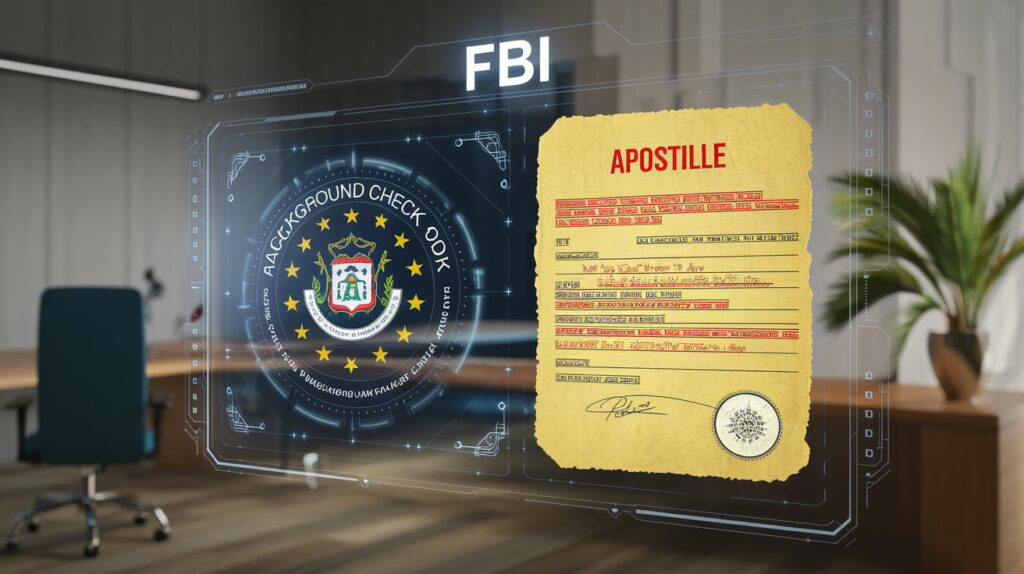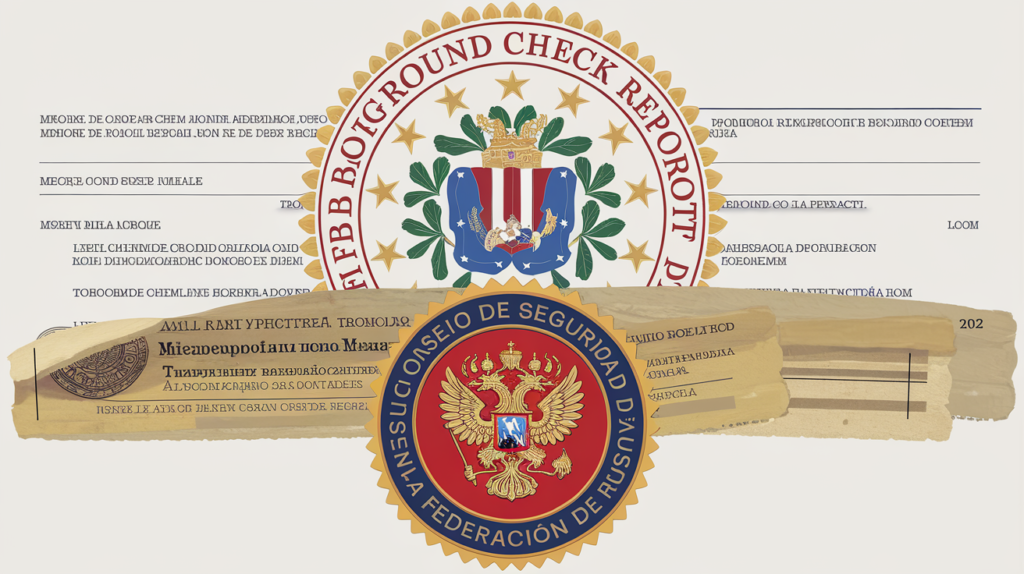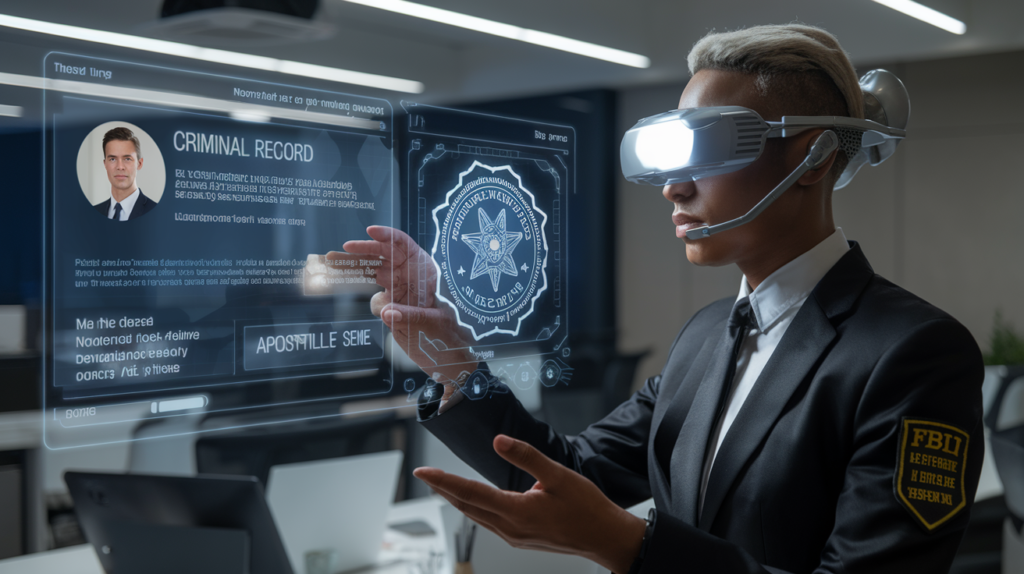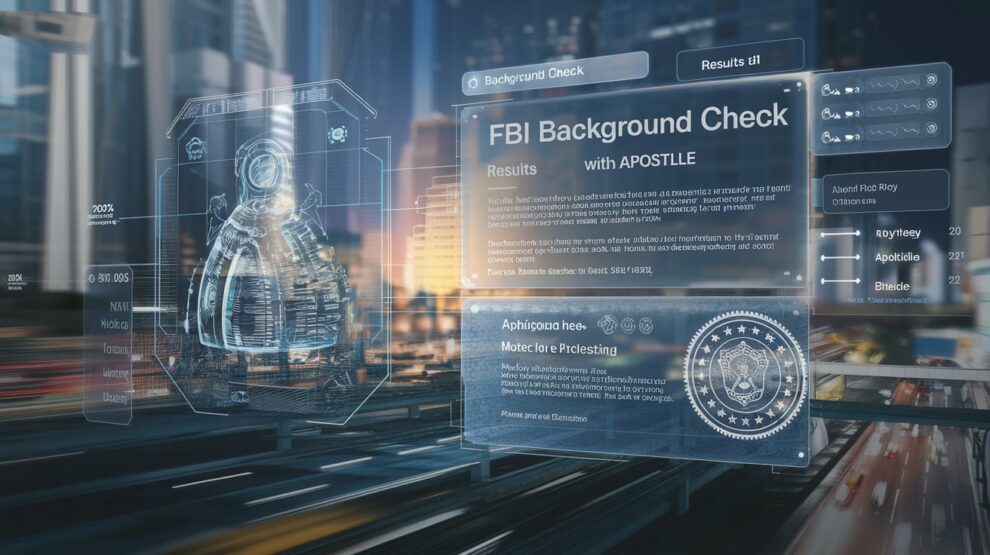Need your FBI background check recognized abroad in 2025? Learn how to get it apostilled quickly and legally for visas, jobs, and international travel.
Table of Contents
In today’s interconnected world, many people find themselves needing to prove their background and identity for international purposes — whether for work, study, immigration, or legal matters. One crucial document often required is an FBI background check, which details your criminal record history in the United States. But when dealing with foreign governments or institutions, an FBI background check alone is not always enough. To make this document legally valid abroad, it must be authenticated with an apostille — a special certification recognized under the Hague Convention.
If you’re applying for a visa, adoption, overseas employment, or any international process, understanding what an FBI background check with apostille is, why it matters, and how to get one can save you time, money, and frustration. In this article, we’ll walk you through the entire process in 2025, including costs, timelines, and tips to ensure your document is accepted internationally.
What Is an FBI Background Check with Apostille?
An FBI background check, also called a Criminal History Summary, is an official document issued by the Federal Bureau of Investigation that outlines a person’s criminal history within the United States. It’s commonly requested by employers, licensing boards, and government agencies to verify that an individual does not have a criminal record or to disclose past offenses.
An apostille is an authentication certificate issued to validate a public document’s legitimacy for international use, under the 1961 Hague Convention. When an apostille is attached to your FBI background check, it confirms to foreign governments that the document is genuine and issued by a legitimate authority in the U.S.
Why Do You Need an Apostille on Your FBI Background Check?
When you’re planning to live, work, study, or even marry abroad, the foreign country you’re dealing with will often ask for proof that your criminal record is clean — or at least verified. In the United States, the most authoritative version of this record is an FBI background check. However, presenting this document alone isn’t always enough for it to be accepted internationally. That’s where the apostille comes into play.
Here’s a more in-depth look at why an apostille is essential:
1. Confirms Authenticity
An apostille acts as a universal stamp of approval that validates the origin of your FBI background check. The apostille is issued by the U.S. Department of State and serves as proof that the document was genuinely issued by a recognized government body — in this case, the Federal Bureau of Investigation (FBI).
- It prevents forgery by showing the document hasn’t been altered.
- It tells foreign authorities that your FBI background check isn’t fake or unofficial.
- It includes details like official seals, signatures, and the issuing agency to verify legitimacy.
This is especially important because foreign governments usually don’t have a direct way to verify U.S. documents independently — the apostille bridges that gap.
2. Ensures Acceptance by Foreign Countries

The apostille system was created by the 1961 Hague Apostille Convention, which streamlined the process of document recognition between participating countries. If the country you’re submitting the document to is part of this treaty (and most are), then:
- Your FBI background check with an apostille will be accepted without needing further embassy or consulate legalization.
- It saves time, money, and paperwork, as apostilled documents bypass lengthy diplomatic channels.
For example, if you’re applying for a work visa in Spain, France, or South Korea — all Hague Convention countries — they will require an apostilled background check to accept it as legally valid.
3. Simplifies the Legalization Process
Without an apostille, your background check must undergo a complex, multi-step authentication process that may include:
- Certification by a notary public (if applicable),
- Authentication at the state level,
- Authentication by the U.S. Department of State,
- And then legalization by the consulate or embassy of the destination country.
This process can be time-consuming and expensive, often taking several weeks or even months.
On the other hand, an apostille:
- Consolidates all of this into one step.
- Eliminates the need for embassy visits (in Hague Convention countries).
- Makes your document ready for immediate use abroad, assuming translation isn’t required.
4. Avoids Rejection or Delays
Foreign government agencies, schools, or employers may reject an FBI background check that lacks an apostille, especially if they’re not familiar with U.S. document formats. Worse, you may only find this out after you’ve submitted your application, causing significant delays or denial of entry, employment, or other legal processes.
By obtaining the apostille in advance, you ensure that:
- Your background check meets international document standards.
- Your paperwork will not be sent back or require resubmission.
- You’re prepared for interviews, deadlines, or legal appointments in your destination country.
Step-by-Step Process to Obtain an FBI Background Check with Apostille
If you’re planning to use your FBI background check outside of the U.S., simply obtaining the report is not enough — you’ll need to follow a specific process to ensure it’s legally recognized abroad. Below is a step-by-step guide to help you navigate this process smoothly:
Step 1: Request Your FBI Background Check
The first step is to obtain your official FBI background check report, which outlines any criminal history associated with your name and fingerprints.
Here’s how to do it:
- Submit Fingerprints: You must provide a fingerprint card (FD-258) as part of your application. This can be done by visiting a local law enforcement agency or a fingerprinting service provider.
- Choose Submission Method:
- Online via FBI’s Website: Faster and preferred for most individuals.
- FBI-Approved Channelers: These private companies are authorized by the FBI to expedite the background check process. They typically offer faster turnaround times and more convenient submission.
- Mail-in Option: If you prefer, you can mail your application and fingerprints directly to the FBI.
Processing Time:
- Online/Channeler: Usually 3–7 business days.
- Mail-in: Typically takes 2–4 weeks.
Once your background check is processed, you’ll receive either a digital copy (PDF) or a hard copy of the report, depending on your selection.
Step 2: Obtain the Apostille
After you’ve received your FBI background check, you now need to get the apostille certificate. This verifies that your document is authentic and eligible for international use under the Hague Apostille Convention.
Here’s how to get it:
- Federal Documents like FBI background checks are apostilled through the U.S. Department of State – Office of Authentications.
You must:
- Prepare the Original FBI Report: Only the official copy (paper or digitally signed PDF) is accepted for apostille.
- Complete the DS-4194 Form: This is the request for authentication services.
- Pay the Apostille Fee: As of 2025, the fee is $20 per document (subject to change).
- Send Your Documents:
- Mail your completed form, payment, and FBI background check to:
U.S. Department of State, Office of Authentications - Include a self-addressed return envelope for them to send your document back.
- You may also opt for expedited service using a courier or third-party apostille service if you’re in a rush.
- Mail your completed form, payment, and FBI background check to:
Step 3: Receive Your Authenticated Document

After the U.S. Department of State verifies the signature and authenticity of your FBI background check, they will attach an apostille certificate directly to your document.
What You Receive:
- The original FBI background check document.
- A one-page apostille certificate issued by the U.S. Department of State.
This combined package is now:
- Legally valid in all Hague Apostille Convention countries.
- Ready for submission for visas, work permits, student enrollment, marriage abroad, or any legal purpose overseas.
Depending on how you submitted the request, it may take:
- 2–3 weeks via standard mail.
- A few days if expedited via a professional apostille service.
Common Uses of FBI Background Checks with Apostille Worldwide
An FBI background check with apostille is a vital legal document used in various international processes. When living, working, or conducting official business abroad, foreign governments and institutions often require authenticated proof of your criminal (or non-criminal) history. The apostille ensures that your FBI background check is officially recognized under international law—specifically, the Hague Apostille Convention.
Below are the most common international scenarios where an FBI background check with apostille is required:
1. Employment Abroad
Many countries require a clean criminal background check from foreign nationals applying for jobs, especially in:
- Education
- Healthcare
- Security sectors
- Finance and banking
Employers want to verify that you do not have a criminal record in your home country. The apostille ensures the FBI document is recognized without further legalization, streamlining hiring and onboarding processes overseas.
2. Long-Term Visa and Residency Applications
Countries such as Spain, Italy, South Korea, and the UAE require an apostilled FBI background check when applying for:
- Work visas
- Student visas
- Investor visas
- Permanent residency or long-term stay permits
Immigration officials need to confirm you’re not a security risk. Submitting an apostilled FBI check prevents your application from being rejected or delayed due to incomplete documentation.
3. Adoption Proceedings
If you’re planning to adopt a child internationally, especially from countries like China, Colombia, or Ukraine, you will likely need to submit an FBI background check with apostille as part of your home study documentation. This ensures:
- You meet international adoption eligibility standards.
- The foreign government can trust your criminal background has been officially verified.
4. Marriage Abroad
Planning to get married in another country? Some governments (e.g., Mexico, the Philippines, or Italy) require proof that you don’t have a criminal record. An apostilled FBI background check helps:
- Confirm your legal capacity to marry.
- Satisfy foreign civil registry office requirements.
Failure to provide an apostille can result in delays or even denial of your marriage registration.
5. Foreign Residency or Citizenship by Investment Programs
High-net-worth individuals applying for residency or citizenship-by-investment programs in countries like Malta, Portugal, or St. Kitts often need:
- Background checks with apostille to pass due diligence checks.
- Verifiable proof of good character and a clean record.
Governments offering these programs are strict about who they grant privileges to, making an apostilled FBI check critical to the approval process.
6. Teaching English or Working in Education Overseas
Countries like South Korea, China, and the UAE commonly request FBI background checks with apostille for those teaching in schools or language institutes. Since educators work with vulnerable populations (i.e., children), international employers need:
- Official criminal background clearance.
- Apostilled proof of authenticity, often accompanied by notarized diplomas and TEFL certifications.
7. Volunteering or Internships Abroad
Even unpaid positions—especially those in humanitarian or nonprofit sectors—may require an apostilled background check. This is particularly true for roles involving:
- Children
- Health care
- Legal aid
- Disaster relief
The apostille guarantees that your record can be trusted without the need for further embassy verification.
How Long Does It Take to Get an FBI Background Check with Apostille?
- FBI background check: 3-5 business days (electronic submission) or longer for mail requests.
- Apostille processing: About 3-5 business days at the Department of State or state offices.
- Total: Approximately 2-4 weeks from start to finish, depending on your chosen services.
Costs and Fees Associated with FBI Background Checks and Apostilles
Obtaining an FBI background check with apostille involves several steps, each with its own associated costs. These fees can vary based on the services you use, whether you opt for expedited processing, and how you choose to submit your documents. Here’s a comprehensive breakdown of the expected expenses:
1. FBI Background Check Fee – $18
The FBI charges $18 for processing a federal criminal background check. You can submit your request:
- Directly through the FBI using their Identity History Summary Check portal.
- Through an FBI-approved Channeler, which may charge a slightly higher fee for faster service (typically $30–$50 depending on the provider).
This fee covers:
- Verification of your identity through submitted fingerprints.
- A summary of your criminal history or confirmation of no criminal record.
2. Fingerprinting Fee – $20 to $50
To request an FBI background check, you must submit your fingerprints on an FD-258 fingerprint card. The cost of fingerprinting can vary:
- Local police stations or sheriff’s offices: Often charge between $20 and $40.
- Private fingerprinting services or live scan providers: May charge $30 to $50, depending on location and technology used.
Note: Some services offer digital fingerprinting and direct submission to the FBI, which can help speed up the process.
3. Apostille Fee – Around $20 (Varies by Jurisdiction)
Once you receive your FBI background check, you’ll need to submit it to the U.S. Department of State – Office of Authentications for an apostille. This is necessary for international legal recognition under the Hague Apostille Convention.
- Standard apostille fee: $20 per document (as of 2025).
- Payment is made to the U.S. Department of State, typically via check or money order.
- Processing times can range from 6 to 8 weeks unless you use expedited service.
Some states offer apostille services, but only if the background check comes through a state agency. For FBI-issued reports, you must go through the federal apostille process.
4. Shipping, Notary, and Expedited Service Fees (Optional but Common)
Shipping Costs
Depending on your method of submission, you may need to pay for:
- Certified mail, USPS, FedEx, or UPS shipping to send documents to and from the Department of State.
- Return envelope with prepaid shipping is often required for faster processing.
Estimated cost: $10 to $50, depending on service and speed.
Notary Fees (if applicable)
Some third-party services may require notarization of your identity before submission.
- Notary costs vary from $5 to $25 per signature, based on state regulations.
Expedited Apostille Services
Many individuals opt for third-party apostille services to handle the paperwork quickly and correctly.
- Costs range from $100 to $300+, depending on how fast you need it and whether international shipping is included.
- These services often include tracking, document verification, and secure handling.
Tips for Ensuring Your FBI Background Check with Apostille Is Accepted Abroad

- Confirm document and apostille requirements for your destination country.
- Use official FBI and government channels.
- Keep copies of all documents.
- Use expedited services if you have tight deadlines.
- Check if certified translations are needed.
Frequently Asked Questions (FAQs)
1. What is an FBI background check with apostille?
An FBI background check with apostille is a federal document (criminal history report) authenticated with an apostille certificate from the U.S. Department of State. This certification confirms the document’s authenticity for use in foreign countries that are part of the Hague Apostille Convention.
2. Who needs an apostilled FBI background check?
You need one if you’re:
- Applying for a visa, residency, or citizenship abroad.
- Seeking employment in a foreign country.
- Enrolling in international schools or universities.
- Getting married overseas.
- Involved in legal proceedings outside the U.S.
3. How long does it take to get an apostille for an FBI background check?
- Standard processing at the U.S. Department of State may take 6–8 weeks.
- Expedited processing through third-party providers can take as little as 1–2 weeks, depending on services used and shipping times.
4. Can I get the FBI background check and apostille electronically?
Yes. The FBI can provide an electronic background check (PDF), which must be printed and mailed for apostille. However, the apostille itself is always a physical certificate attached to a physical document.
Conclusion
Getting an FBI background check with an apostille is essential for anyone dealing with legal, professional, or personal matters overseas. The apostille certifies the authenticity of your background check, ensuring it’s recognized abroad without extra bureaucratic hurdles.
Although the process involves multiple steps—like fingerprinting, requesting the report, and submitting it for apostille—the time and cost are worthwhile if you’re preparing to live, work, or study internationally.
By understanding the costs, timelines, and required documentation, you can navigate this process smoothly and avoid costly delays. Whether you’re applying for a visa or pursuing a career abroad, an apostilled FBI background check is your passport to compliance and peace of mind.
Do Follow Dragcast on Social Media For More Such Content.








Add Comment